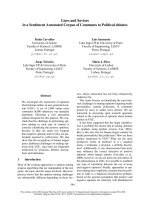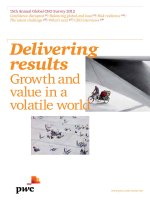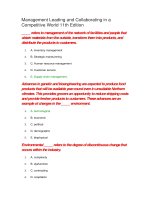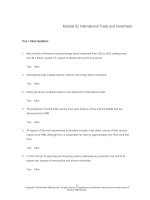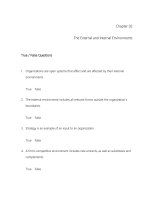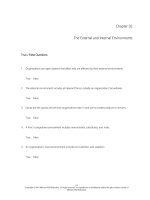Linguistic abilities and identity in a globalizing world perspectives of proficient taiwanese english users
Bạn đang xem bản rút gọn của tài liệu. Xem và tải ngay bản đầy đủ của tài liệu tại đây (1.04 MB, 414 trang )
LINGUISTIC ABILITIES AND IDENTITY IN A GLOBALIZING WORLD:
PERSPECTIVES FROM PROFICIENT TAIWANESE ENGLISH USERS
MARK FIFER SEILHAMER
A THESIS SUBMITTED
FOR THE DEGREE OF DOCTOR OF PHILOSOPHY
IN ENGLISH LANGUAGE
DEPARTMENT OF ENGLISH LANGUAGE AND LITERATURE
NATIONAL UNIVERSITY OF SINGAPORE
2010
ii
ACKNOWLEDGEMENTS
There are a number of people that I owe a debt of gratitude for helping to make
the completion of this dissertation a reality.
First and foremost, I would like to thank the participants of this study, my
former students in Taiwan, for nothing here could have been possible without
their participation. The focal and stand-by participants, in particular, welcomed
me into their lives and enthusiastically embraced this project, devoting a
considerable amount of time, not only to speaking with me at length, both in
person and through continuous e-mail communication, but also to carefully
reading all the drafts of their stories and giving me detailed feedback. Thank you
all so very much.
The faculty of the English department at the college in Taiwan that I refer to as
Saint Agnes College were also very welcoming to me as I returned there to
conduct my research. To both the chair of the department, who officially
endorsed my research there, allowing me to get approval from the NUS
Institutional Review Board, and the faculty members who set aside time for our
interviews, I owe many thanks.
The three members of my thesis committee also assisted greatly in the
completion of this dissertation. Dr. Lionel Wee, my thesis supervisor, always
served as a source of sound advice and insights which sometimes sent my
research in unexpected, but fruitful directions. Without his professional support,
feedback, and encouragement, I would certainly not have been able to finish this
dissertation as quickly as I have. Dr. Joseph Park and Dr. Mie Hiramoto, the
iii
other two members of my committee, also provided me with valuable comments
and suggestions. I was fortunate to have been a TA for Dr. Park and Dr.
Hiramoto was someone I could reminisce with about our shared experience at
University of Hawaii. Thank you all!
Finally, I want to thank my wife Yoriko and son Nikita for always being there
for me and enduring all my years of graduate study. It's your turn now, Yoriko.
iv
TABLE OF CONTENTS
Summary xi
List of Tables xiii
List of Figures xiv
Chapter 1: A Globalizing World 1
1.1 Introduction…………………………… ……………………………1
1.2 Globalization…………………………………… ……………… 4
1.3 The Spread of English…………………………………………………7
1.4 Research Questions……………………………………………… …14
Chapter 2: Key Issues & Theoretical Concepts 20
2.1 Identity…………… 20
2.2 Bilingualism 26
2.3 Expertise, Affiliation, and Inheritance 29
2.4 Investment 30
2.5 Communities 32
2.5.1 Communities of Practice 32
2.5.2 Discourse Communities 34
2.5.3 Imagined Communities 36
2.6 Enterprise Culture and the Entrepreneurial Self 38
Chapter 3: The Taiwanese Context 42
v
3.1 The Emergence of a Taiwanese Group Identity 43
3.2 Discourses of English in Taiwan 45
3.3 Studies of English Use and Attitudes about English in Taiwan 51
3.4 The Taiwanese Educational System………………………… …….54
3.5 The Micro-Context: Saint Agnes College 58
Chapter 4: Methodology 62
4.1 Narrative Inquiry… 62
4.2 Methodology 67
4.3 My Story and Position as Researcher 71
Chapter 5: Written Questionnaire Responses 78
5.1 Demographic Information 79
5.2 Mandarin Chinese 82
5.3 English 86
5.4 French 96
5.5 Tai-yu 103
5.6 Other Languages in Participants' Linguistic Repertoires 109
5.6.1 Maggie's Japanese 109
5.6.2 Elise's Hakka 110
5.6.3 Nana's Cantonese 110
5.6.4 Gigi's Italian 111
5.6.5 Dreamy's Korean 111
5. 7 Most Important Language for Future Children 112
5.8 Plans for after Graduation from the Saint Agnes
Five-year Program 115
vi
5.9 Languages Participants Imagine Themselves Using
in the Distant Future 117
5.10 Entrepreneurial Self Qualities 119
5.11 Concluding Remarks about
about Written Questionnaire Responses 121
Chapter 6: Gigi's Story 124
6.1 Life before Saint Agnes 124
6.2 Struggles at Saint Agnes 129
6.3 English Debate Society 131
6.4 Foreign Friends 133
6.5 Facebook 137
6.6 Other Opportunities for Foreign Language Use
while Attending Saint Agnes 139
6.7 Anticipating a Career in Design 143
6.8 The Place of Italian, French, and English
in Gigi's Life as of May 2009 148
6.9 After Saint Agnes Graduation 150
6.10 Opportunities for Foreign Language Use
after Saint Agnes Graduation 157
6.10.1 Teaching English 158
6.10.2 Communication with Amedeo,
his Family, and his Friends 159
6.10.3 English Online Media 161
6.11 Updated Vision of the Future 161
6.12 English as a "Door to the World" 163
6.13 Cultural Associations with English and Italian 166
vii
6.14 Ownership of English 167
6.15 Mandarin Chinese and Tai-yu Attrition 168
6.16 Conclusion to Gigi's Story 170
Chapter 7: Audrey's Story 173
7.1 Life Before Saint Agnes 173
7.2 Life at Saint Agnes 177
7.3 Working in Establishments that
Cater to Foreigners 184
7.4 Facebook and the Use of Different Languages
to Express Different Emotions 186
7.5 Tai-yu Revitalization 189
7.6 Different Languages, Different Selves 191
7.7 Plans for Life After Saint Agnes Graduation 194
7.8 English Ownership 197
7.9 After Saint Agnes Graduation 198
7.9.1 Employment 199
7.9.2 Independence 203
7.9.3 Community of Mostly Foreign Friends 205
7.10 Trips to Korea and South Africa 208
7.11 Professional Aspirations 210
7.12 Updated Relationships with Languages 211
7.13 Conclusion to Audrey's Story 215
Chapter 8: Rachel's Story 219
8.1 Life before Saint Agnes 219
viii
8.2 Early Years at Saint Agnes 222
8.3 Dreams Coming True 227
8.4 Second French Trip and Fifth Year at Saint Agnes 232
8.5 Future Plans as of May 2009 Interview 235
8.6 Tai-yu 239
8.7 Mandarin Chinese 242
8.8 English and French 243
8.9 Concern for her Mother 246
8.10 Life after Graduation 248
8.10.1 Job Interviews 248
8.10.2 A Quick Succession of Jobs 250
8.10.3 Selling Thermal Fans 252
8.10.4 Teaching English 255
8.10.5 Financial Support for her Mother 257
8.11 French Update 259
8.12 English Update 260
8.13 Conclusion to Rachel's Story 264
Chapter 9: Shannon's Story 268
9.1 Life before Saint Agnes 269
9.2 Life in the Saint Agnes Five-year Program 276
9.3 Additional Opportunities to Use English 279
9.3.1 Tutoring Jobs 279
9.3.2 Computer-mediated English Use as of May 2009 280
ix
9.3.3 English Use with her Brother 282
9.3.4 Pretending to be a Foreigner 283
9.4 Future Plans as of May 2009 285
9.5 Relationships with Various Languages as of May 2009 288
9.6 Life after Graduation 293
9.6.1 The Saint Agnes Translation & Interpretation Program 293
9.6.2 Employment 298
9.6.3 World Model United Nations 301
9.6.4 Computer-mediated English Use Update 305
9.6.5 France 306
9.7 Updated Plans for the Future 309
9.8 Relationship with English 310
9.9 Conclusion to Shannon's Story 312
Chapter 10: Discussion and Implications 318
10.1 Research Question 1 318
10.1.1 Differentiation from Others via English 319
10.1.2 English Cram School Experiences 325
10.1.3 English-Speaking Community Investment 330
10.1.4 Impact of Other Language Abilities
on Participants' Identities 338
10.2 Research Question 2 343
10.3 Research Question 3 350
10.4 Research Question 4 354
x
10.5 Implications of this Study……………… ………………362
10.5.1 Theoretical Implications 362
10.5.2 Pedagogical Implications 370
10.5.3 Policy Implication 376
10.8 Suggestions for Further Research 377
References 381
Appendix 396
xi
SUMMARY
Linguistic Abilities and Identity in a Globalizing World:
Perspectives from Proficient Taiwanese English Users
by
Mark Fifer Seilhamer
Various forces of globalization, all operating in tandem, have served to lessen
the extent to which English is considered a foreign language of the 'other' for its
users around the world. As more and more people use the language to facilitate
communication in diverse and increasingly interconnected communities, it can no
longer be assumed that its learners associate English with historically 'native'
contexts of English use. Many, some scholars argue, are coming to conceptualize
themselves as members of an imagined global community of English users and
English as one of their own languages.
This qualitative longitudinal study takes a narrative inquiry approach, presenting
the stories of four young adult Taiwanese focal participants that are all quite
proficient English users. It examines the role that linguistic abilities (particularly
English abilities, but also French, Italian, and local languages) play in these
participants' identity construction processes, their affiliations with and sense of
ownership in the English language, and how their lives are impacted by their
internalization of various globalization discourses. These include the discourses
xii
of internationalization and competitiveness that are continuously put forth by the
Taiwan government, as well as enterprise culture discourses, which emphasize the
importance of qualities associated with the 'entrepreneurial self,' such as self-
reliance, boldness, and willingness to take risks to achieve goals.
With a theoretical lens that incorporates various concepts, such as Norton's
notion of investment and Bucholtz & Hall’s sociocultural linguistic approach to
identity, this study chronicles focal participants' experiences over the course of
the year following their graduation from a college specializing in languages,
documenting their participation in different sorts of communities (communities of
practice, Discourse communities, and imagined communities) as well as their
sometimes shifting language affiliations. The extent to which participants were
found to claim ownership in the English language varied, and whether they
oriented more toward membership in an imagined global community of English
users or associated the English language more with speakers from traditionally
English-speaking Western countries was largely dependant on what communities
they happened to have found themselves participating in. For all four participants,
however, their English abilities have served, throughout their lives (since
elementary school in most cases), to differentiate them from others, making
someone who is good at English (relative to their peers) an integral part of their
identities. All of them also associated English with upward mobility and
considered it an essential tool for making one's voice heard in the world today.
xiii
LIST OF TABLES
Table 5.1 Participants' Overseas Travel Experiences
as of May 12, 2009 81
Table 5.2 Self-evaluation of Mandarin Chinese Expertise 83
Table 5.3 Self-evaluation of English Expertise 87
Table 5.4 Ages that Participants Began Learning English 88
Table 5.5 Groups Participants Reported Using English with 89
Table 5.6 Self-evaluation of French Expertise 98
Table 5.7 Self-evaluation of Tai-yu Expertise 104
Table 5.8 Self-evaluation of Entrepreneurial Self Qualities 120
xiv
LIST OF FIGURES
Figure 10.1 Pennycook's 3D Transtextual Model of English Use 368
1
Chapter 1
A Globalizing World
1.1 Introduction
The central concern of this dissertation is the relationship between linguistic
abilities and identity – how what one can do with language impacts the sense of
who one is. "The question 'Who am I?',” Norton (1997) asserts, “cannot be
understood apart from the question 'What can I do?'" (p. 410). To this statement, I
will add "What do I wish to do?" as being an equally consequential question to
consider, for as West (1992) points out, “How you construct your identity is
predicated on how you construct desire” (p. 20).
Today’s globalizing world presents many of its denizens an unprecedented
array of potential aspirations, many of which necessitate the use of English. This,
according to Halliday (2003), is the very circumstance that causes an international
lingua franca to take root. “Things can be done with this language,” he explains,
“ – things that [people] want to do – that cannot be done, or done successfully,
without it" (p. 412). Indeed, if one wishes to be engaged today in domains of
science, technology, diplomacy, or travel, English is arguably indispensable.
Since no single language has ever before been employed on such a massive scale,
it is not surprising that there has been much scholarly debate on the phenomenon
of global English use and its political, sociocultural, ideological, and pedagogical
implications.
2
In applied linguistics circles, one of the most polarizing areas of the global
English debate has been the English as a lingua franca (ELF) research paradigm,
which critics contend aims to impose new norms on learners of English. ELF
research focuses on communication in which English is indeed functioning as a
true lingua franca – “a ‘contact language’ between persons who share neither a
common native tongue nor a common (national) culture, and for whom English is
the chosen foreign language of communication” (Firth, 1996, p. 240, italics in
original). Stressing the significance of the name English as a lingua franca, one
of its main proponents, Jenkins (2000) explains, “the Latin name symbolically
removes the ownership of English from the Anglos both to no one and, in effect,
to everyone” (p. 11).
Directly related to identity, the ability to claim ownership of English is an
important theme of this dissertation. Although linguists have long asserted that
individuals who have learned English as a second or foreign language can rightly
claim ownership of the language
1
, many researchers (e.g., Ke, 2009; Matsuda,
2003, Yildirim & Okan, 2007) have found such individuals extremely reluctant to
claim English ownership. Other scholars, however, offer more optimistic
assessments of their study participants’ capacity for ownership claims.
Kawanami & Kawanami (2009) report seeing “a glimpse of potential ownership”
(p. 58) in comments made by their Japanese junior and senior high school student
participants. Phan (2009) found her study participants, international students
from various Asian countries taking English medium courses at a Thai university,
1
Almost 20 years ago, Nelson (1992), for example, proclaimed, “Each English user must now say
‘It is my language’ and then adapt it variously to appropriate contexts, in ‘my’ culture or
another’s” (p. 337).
3
to have already developed “a healthy and sensible sense of sharing the ownership
of English” (p. 201). Such reports of potential and realized English ownership
support the prediction by Warschauer (2000) that
as a result of changes in globalization, employment, and technology,
L2 speakers of English will use the language less as an object of foreign
study and more as an additional language of their own to have an impact
on and change the world. They will use English, together with technology,
to express their identity and make their voices heard (p. 530)
2
.
This dissertation is a qualitative multi-case study in which the focal participants
were chosen specifically because I felt they personified the L2 speakers of
English that Warschauer describes in the above prediction. These four Taiwanese
young women were my former students – English users who, in my internet
communication with them in the years following my departure from Taiwan,
seemed to regard English as one of their languages as they confidently used it to
project various aspects of their identities online. This dissertation tells their
stories, examining the role that their ability to use English and other languages
played in their identity construction, their sense of ownership in the English
language, and how the internalization of various globalization discourses
impacted their lives throughout the duration of the study.
In this chapter, I first take a closer look at what exactly the phrase a globalizing
world entails, examining the notion of globalization and various
2
Warschauer is by no means alone in expressing this belief. Graddol (1997, 2007), for example,
makes similar predictions.
4
conceptualizations of the global spread of English. I then introduce my research
questions and discuss the significance of this study.
1.2 Globalization
The term globalization, so frequently regarded as a taken-for-granted common
sense principle and more often than not bandied about with no definition
whatsoever, has actually reached the level of mass consciousness only in
relatively recent years. In fact, according to Ghafele (2004), none of the major
encyclopedias of the world, such as Larousse or Encyclopedia Britannica,
included entries for or references to the term until the early 1990's. When
globalization is defined, the different theorists positing these definitions showcase
somewhat differing perspectives.
A definition such as "the broadening and deepening of national economies into
a worldwide market for goods, services and capital" (Ohiorhenuan, 2000, p. 56)
does not necessarily depict globalization as a new phenomenon at all. Such a
definition could easily apply to a great many instances of intensified trade
throughout history. Trade in Indian spices and textiles, for example, served to
link the then-known world for centuries and brought radical changes to European
culture and tastes.
Giddens (1990) does not restrict globalization to the domain of economics,
defining it more broadly as "the intensification of worldwide social relations
which link distinct localities in such a way that local happenings are shaped by
events occurring miles away and vise versa" (p. 64). In one sense, this definition
5
is significantly broader, focusing on "social relations" instead of just economic
ones. In other ways, however, this definition is more specific in its emphasis on
the impact felt by localities.
Still other theorists offer definitions that include an aspect of conscious
awareness by the masses. Waters (1995), for instance, defines globalization as "a
social process in which the constraints of geography on social and cultural
arrangements recede and in which people become increasingly aware that they are
receding" (p. 3). Robertson (1992) also includes this dimension of consciousness
in his definition: "both the compression of the world and the intensification of
consciousness of the world as a whole" (p. 9).
Friedman (2005) conceptualizes globalization as having occurred in three
distinct phases: Globalization 1.0, Globalization 2.0, and Globalization 3.0.
Globalization 1.0, Friedman explains, basically began in 1492 with Columbus'
voyage to the Americas, which triggered imperialistic expansion by European
powers. Globalization 2.0, he contends, began around 1800 and was powered by
the industrial revolution. Friedman goes on to discuss ten forces that have jointly
brought about the recent transition to Globalization 3.0. These ten forces, which
he terms flatteners, are: the collapse of the Soviet Union, the increase in internet
connectivity, the development of work flow software, internet uploading,
outsourcing, supply-chaining, insourcing, the proliferation and development of
internet search tools, and lastly, other new mobile technological advances that he
dubs "the steroids to amplify and further empower all the other forms of
6
collaboration" (p. 198). Friedman contrasts the three different phases of
globalization as follows:
While the dynamic force in Globalization 1.0 was countries globalizing
and the dynamic force in Globalization 2.0 was companies globalizing,
the dynamic force in Globalization 3.0 – the force that gives it its unique
character – is the newfound power for individuals to collaborate and
compete globally (p. 10).
Friedman later qualifies this statement about the empowerment of individuals,
explaining that Globalization 3.0, in fact, only offers the potential for the
empowerment of some individuals. "There are hundreds of millions of people on
this planet,” he reminds us, “who have been left behind by the flattening process
or feel overwhelmed by it" (p. 461).
In his introduction to a Journal of Sociolinguistics special issue devoted to the
topic of globalization, Coupland (2003) lists four defining globalization concepts
that he says have been helpful in his own research: commodification,
disembedding, community interdependence, and the compression of time and
space. All four of these defining concepts have, over the course of the last few
decades, profoundly impacted language learning and teaching throughout the
world. Some researchers, for instance – most notably Heller (2003) – have
argued that languages are increasingly being regarded as economic commodities
and less as markers of national or ethnic identity. As Block & Cameron (2002)
point out, this shift toward viewing languages as commodities "affects both
people's motivations for learning languages and their choices about which
7
languages to learn. It also affects the choices made by institutions (local and
national, public and private) as they allocate resources for language education" (p.
5). The disembedding of English from its historically 'native' contexts for use as a
lingua franca on a global scale, and the interdependence between communities
that has necessitated large scale intercultural communication have both also had
great repercussions on the choices made by language learners and policy makers
alike. Finally, the compression of time and space, facilitated by new technologies
such as various forms of computer mediated communication and satellite
television, has radically altered the degree and nature of language learners'
interaction with the world beyond their immediate localities.
1.3 The Spread of English
Facilitating globalization's compression of time and space, and indeed making
it possible for the globalization process to proceed at warp speed, is the global
spread of English, and responses to this phenomenon have been no less diverse
than reactions to globalization itself. As Ryan (2006) notes, the spread of English
"may be seen as a utopian development fostering greater understanding and
communication while creating opportunities for its users, or it can be regarded as
a dystopian process imposing language as the tool of one particular economic
system, denying diversity and opportunity to others" (p. 28). Scholarly accounts
of the process also represent a broad range of orientations. Pennycook (2001)
identifies six different approaches that have been used to conceptualize the role of
English in the modern world: the colonial celebratory position, laissez-faire
8
liberalism, linguistic imperialism, language ecology and language rights,
linguistic hybridity, and postcolonial performativity.
Of these approaches, the most conservative by far is the colonial celebratory
position, which views the English language as being superior to all others, both
intrinsically and in its possible range of functions. Adherents to this position,
therefore, see the English language's dominance over others as being right and
natural. Despite the fact that few academics these days would blatantly espouse
this position, Pennycook (2001) maintains that its influence should not be
underestimated.
The position that seems to hold the most sway among academics is the one
Pennycook (2001) calls laissez-faire liberalism. According to this approach,
English and local languages are perfectly capable of harmonious co-existence,
with local languages being used for local purposes and English serving as a
language of wider communication. This is a view that is certainly appealing,
offering English language educators a way to justify their trade, while at the same
time feeling secure in the knowledge that they are maintaining respect for other
languages. The laissez-faire liberal view has faced criticism, however, for being
overly simplistic and socially naïve in the way it conceptualizes language
complementarity, "assigning to English a role of global communication while
other languages are condemned to do the homework of identity" (Pennycook,
2003: 516). Phillipson (1999) also finds fault with the laissez-faire liberal
approach, arguing that its uncritical political stance in effect endorses all the ills
of globalization and imperialism.
9
Phillipson's (1992) own linguistic imperialism approach characterizes the
spread of English as beginning with British and American governments actively
promoting the English language in their colonies and the dominance of English
continuing to be maintained through various hegemonic forces in order to support
political and economic interests. In recent years, this approach has been critiqued
extensively, most notably by Brutt-Griffler (2002, 2006), who questions the
historical accuracy of Phillipson's work, arguing that "the spread of English was
not unilaterally imposed on passive subjects, but wrested from an unwilling
imperial authority as part of the struggle by them against colonialism" (Brutt-
Griffler, 2002: 31, italics in original). Brutt-Griffler (2002) and Pennycook (2001)
also criticize the lack of agency afforded to individuals in the linguistic
imperialism framework, since residents of periphery countries choosing to use
English or other exogenous languages are regarded, under Phillipson's approach,
not as exercising free will, but instead acting merely as tools of hegemonic neo-
colonialist forces.
Closely related ideologically to the linguistic imperialism view is the language
ecology and language rights perspective (e.g., Mühlhäusler, 1996; Phillipson &
Skutnabb-Kangas, 1996; Skutnabb-Kangas, 2003). Utilizing the environmentalist
ecology metaphor to full effect, this approach characterizes English and other
exogenous languages as imminent threats to local languages, emphasizing the
need to focus attention on the preservation of local languages and support
language rights. While the notion of standing up for linguistic human rights is
indeed an admirable sentiment, this approach suffers from the same basic problem
10
that plagues the linguistic imperialism framework in that it reduces the wide range
of complex linguistic situations present in the world today to black and white
political struggles between indigenous and killer foreign languages. Mufwene
(2002) takes issue with such characterizations, reminding us that "languages do
not kill languages; their own speakers do, giving them up " (p. 20).
In contrast to the absolutism of the linguistic imperialism and language ecology
and language rights frameworks that view languages in contact as necessarily
being in competition, the approach Pennycook (2001) terms linguistic hybridity
focuses on how English has been adapted to suit local contexts, creating new
institutionalized varieties of English. This position is best exemplified by the
world Englishes paradigm and its model of concentric circles (Kachru, 1985),
which conceptualizes all the varieties of English in the world as falling into one of
three concentric circles: the inner circle, which includes only the countries where
English is traditionally spoken as a native language (England, the United States,
Canada, Australia, and New Zealand); the outer circle, where English has a
substantial societal role and often official status (mostly former British colonies,
such as India and Singapore); and the expanding circle, which basically includes
the rest of the world – countries where the status of English is that of a foreign
language that can generally be acquired only through education.
Some of the work done within the world Englishes paradigm explicitly
questions the hegemonic forces that privilege inner circle norms, challenging the
notion that inner circle speakers have exclusive ownership of the language (e.g.,
Kachru, 1982). More often, however, such arguments remain implicit and the
11
focus is instead on description, pointing out how features of outer circle English
varieties are, in fact, highly systematic (rather than mere errors), with the
underlying goal of establishing legitimacy for these varieties on the basis of such
systematicity. The lack of an overt critical perspective in much of the literature
on world Englishes has resulted in charges of apolitical relativism being leveled at
the paradigm by Canagarajah (1999) and others.
Pennycook (2003) identifies several other shortcomings that weaken the world
Englishes paradigm. The most disconcerting aspect of the paradigm, he contends,
is the way that it "constructs speaker identity along national lines" (p. 519),
deterministically assigning specific varieties of English to individuals according
to what country they happen to live in and which of the concentric circles that
country is located within. Pennycook (2003) also asserts that the world Englishes
paradigm has actually perpetuated the native/non-native speaker dichotomy.
While acknowledging that the paradigm has done an admirable job of challenging
the right of ‘native speakers’
3
to dictate English standards and norms, he also
charges that "it has generally failed to question the NS/NNS dichotomy in any
profound fashion, and indeed has supported an insidious divide between ‘native’
and indigenized English" (p. 520). In addition to these criticisms, Pennycook
(2003) also labels the world Englishes paradigm "insistently exclusionary" (p.
521), and there is indeed much basis for this charge, since, with its focus on
revealing the systematic nature of institutionalized English varieties, the
3
Following Prodromou (2008), I put the term ‘native speaker’ in single quotes throughout this
dissertation to indicate that I question the validity of the term and don’t hold a deficit view of L2
use.
